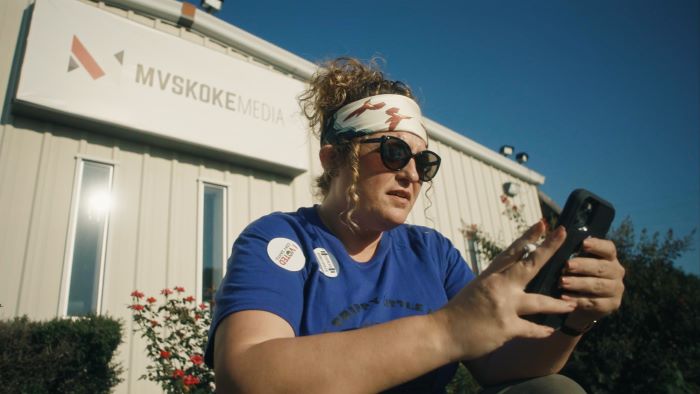It’s not uncommon these days to hear people say they need to take a break from the news. It’s an understandable, even a healthy decision to make, considering how many outlets there are that are full of information (or possibly misinformation), and how addictive they can be. However, not everyone has that luxury, and the following documentaries direct our gaze to places in the world where freedom of press is especially fraught. Both recently screened at DOC NYC, and are currently available on the festival’s platform until November 26.
While We Watched scrutinizes the Indian media landscape under Prime Minister Narenda Modi. “Plunge” is perhaps a better word than “introduce.” Director Vinay Shukla profiles a journalist who does his job with breakneck vigor and speed, Ravish Kumar, the senior executive editor of NDTV, a left-leaning news channel dedicated to free journalistic inquiry. In this case, this necessarily includes combatting the rampant hate mongering and disinformation of Modi’s government, one that is intent on labeling dissenters as “anti-nationalists.”
The film follows Kumar in the years before Modi’s reelection in 2019. His work meetings, broadcasts, public speeches, and the rare moments alone with his family are interspersed with clips from the pro-Modi news sources. A few times, Kumar is berated by nationalists in public as he continues to carry on reporting on problems like rampant poverty. He wins awards, he speaks at universities, he worries silently for the future of his profession—and his daughter is worried for his safety. Once, the station is sabotaged and transmission cuts out. More than a few of his colleagues depart from NDTV; they are worried that it has no future. Although Kumar loses his cool a few times, he does not swerve from his purpose.
Certainly, this film can accurately be described as a portrait of a man (and his cohorts) who will not back down from their principles in the face of incredible adversity. Where it succeeds most of all is in the state of mind it creates, which, presumably, the filmmaker intends as that of modern India. The frenetic pace, the juxtaposition of Kumar’s reporting with the constant berating of the nationalist anchors, and the expert editing all create an undeniably chilling portrait of a nation embraced by hysteria—the impression is one of constant clamor. Even if While We Watched ends on a somewhat optimistic note, it’s hard to feel hopeful considering what Kumar is up against. Indeed, there is already a reason for increased pessimism: NDTV has been bought by a conservative billionaire, and Kumar, after quitting in protest, has been forced to continue his work on a YouTube channel.
Rebecca Landsberry-Baker and Joe Peeler’s Bad Press turns its gaze toward the Muscogee Nation in Oklahoma. Very few federally recognized Indian reservations have any laws regarding free press. As the documentary begins, the Muscogee Nation’s constitution has that guarantee. However, Mvskoke Media has faced serious pressure from the tribe’s elected chief and other high officials when they have sought to accurately report on corrupt government behavior in print and on its YouTube channel.
The film is notable for the matter-of-factness with which it captures government officials acting calmly at a hearing where they pass a constitutional amendment that would censor the press, and they succeed. The constitution is incredibly young (having been formed in 1978) and the nation small, so that bureaucratic details are carried out on a much smaller scale. A recount of votes is accomplished in a small room, the ballots being housed in three large boxes.
The central thread here is the fight to maintain freedom of press. Reporter Angel Ellis makes the fascinating point that tribal officials might be especially anxious to suppress information that puts them in a bad light, given the United States’ historic mistreatment (to put it mildly) of Native Americans. When the world is raining down on you constantly, who needs bad publicity? (The reporter’s point of view is that we all need to “own up to our shit” regardless.)
There is some history regarding the development of tribal constitutions and what they have offered by way of freedom of press, and we do hear about some of the alleged crimes that officials want covered up (embezzlement, sexual assault). However, we don’t hear enough about the controversies. (Is embezzlement so common among tribal officials?) What viewers do hear, in overabundance, are the Mvskoke Media reporters commenting on the emotional experience of their workplace being on the brink of shutting down.
Bad News is notable for the way it treats its subject with pragmatism rather than idealism and for the window it provides into a world that has previously received little representation.


















Leave A Comment